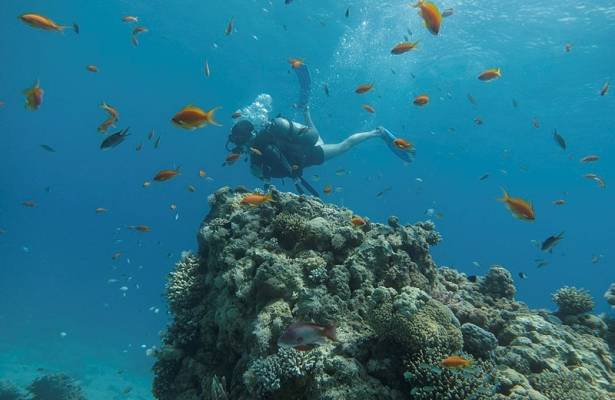While most coral reefs are dying on a massive scale around the world, Eilat’s reef has shown an upward trend of about half a percent per year in live coral cover.
By: United with Israel Staff
In a world where coral reefs are shrinking rapidly, the coral reefs in the Gulf of Eilat have grown, thanks to Israel’s Ministry of Environmental Protection (MoEP) and the Israel Nature and Parks Authority, whose work to minimize the impact of factory discharges into the sea and other events is paying off.
The MoEP published this week the 2017 Red Sea Monitoring Report, written by the Interuniversity Institute for Marine Sciences in Eilat. The report notes that protecting the coral reef should top any agenda to promote development in the Gulf of Eilat, in order to preserve it for future generations.
Coral reefs are dying on a massive scale around the world, mostly due to global warming. Rising ocean temperatures and levels of acidity cause frequent bleaching events, leading to the ultimate death of the coral. Only a third of Australia’s Great Barrier Reef’s ecosystem, the planet’s largest reef, and a World Heritage Site, remains unbleached.
The report found that unlike other reefs in the world, a multi-year statistical analysis of Eilat’s reef shows an upward trend of about half a percent per year in live coral cover at all surveyed reef sites.
The live coral cover is the foremost metric reflecting the state of the reef, and significant fluctuations in the live coral cover between sites and years have been recorded.
During the initial years of monitoring between 2004 and 2006, average coral cover in Eilat was 19-20 percent. In the interval years of 2007-2012, average cover increased and fluctuated in the range 21.5-23.9 percent, and in 2013 the highest average cover was recorded at 26.4 percent.
Since then, the average coral cover at Eilat ranges between 24.1 percent and 25.3 percent. Changes in the live coral cover are not monotonic and vary from site to site, but overall a significant rise in coral cover is revealed by NMP measurements, averaging around half of a percent per year.
Average coral density between all monitored sites has gradually increased since 2010 and is higher than that of the initial years of monitoring, although year to year changes are small. Throughout the monitored period, there has also been a gradual increase in the fraction of medium and large coral colonies, indicating improved coral survival over time.
Coral reefs in the Gulf of Eilat, on Israel’s southern coast at the northern tip of the Red Sea, are particularly resistant to global warming and could possibly be used to re-seed dying reefs in other parts of the world, according to a June study by Israeli and Swiss scientists.
The study found that the Gulf reefs exhibit resistance to high water temperatures and ocean acidification, both consequences of global warming.
Send Passover Packages to Needy Israeli Soldiers - Bring Them Joy!
We are honored to thank the young men and women of the IDF who risk their lives every day to protect the citizens of Israel. Since October 7th, soldiers have been on the battlefield for months - many are hoping to come home for Passover.
Join us in sending Passover food packages (and personal notes) to Israeli soldiers and their families.
Many soldiers spend the Passover holiday with needy families back home. The soldiers greatly appreciate your love and concern. Bring them Passover joy!
CLICK HERE TO SEND YOUR PACKAGE AND NOTE TO ISRAELI SOLDIERS!




